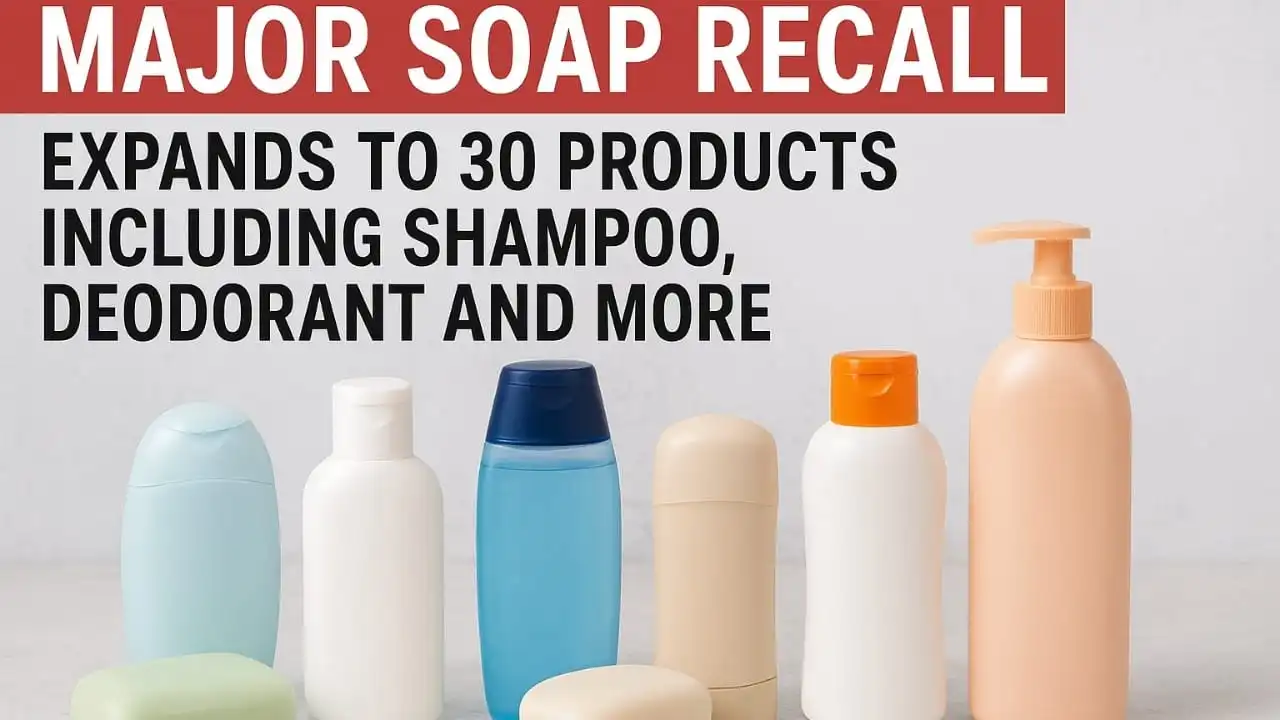A major consumer safety alert is unfolding as DermaRite Industries has significantly expanded its recall of personal care products. What began in July as a targeted recall of select soaps has now widened to more than 30 products, including deodorants, lotions, shampoos, body washes, and hand sanitizers. The reason behind this expansion is the discovery of potential contamination with Burkholderia cepacia complex (Bcc), a group of bacteria that can pose serious health risks, particularly to individuals with compromised immune systems.
This recall has impacted consumers nationwide in the United States, as well as Puerto Rico, raising widespread concerns over product safety, distribution monitoring, and healthcare risks. In this article, we explore the details of the recall, the potential health implications, the full list of recalled products, consumer response steps, and what this incident means for the personal care and healthcare industries.
Understanding the Recall
The initial recall issued in July focused on a handful of products after routine testing revealed bacterial contamination risks. As further investigations and testing continued, the scope of concern widened dramatically. DermaRite Industries decided to include an extensive range of its product line in the recall to protect public health.
According to the company’s announcement, the bacterium Burkholderia cepacia complex is the contaminant of concern. While not a significant threat to healthy individuals, it can cause severe and life-threatening infections in people with weakened immune systems, chronic lung conditions, or those receiving medical care.
Why Burkholderia Cepacia Complex Is a Concern
The Burkholderia cepacia complex is not an everyday bacterium consumers worry about, but in healthcare and pharmaceutical contexts, it is well known. Bcc is a group of bacteria that are naturally resistant to many common antibiotics, making infections harder to treat.
Health Risks Linked to Exposure
-
Healthy individuals: May develop minor localized skin infections if they have cuts, abrasions, or lesions.
-
Immunocompromised individuals: Risk of systemic infections, including bloodstream infections and sepsis.
-
Respiratory patients: For those with chronic lung conditions such as cystic fibrosis, exposure can worsen respiratory symptoms and trigger infections.
Common Symptoms of Infection
-
Persistent fever
-
Fatigue or general weakness
-
Respiratory distress, cough, or shortness of breath
-
Skin infections or rashes that do not heal
-
Potential bloodstream infections leading to sepsis in severe cases
Because of these risks, healthcare institutions such as nursing homes, hospitals, and rehabilitation centers that rely on DermaRite hygiene products must act quickly to prevent outbreaks.
Products Included in the Recall
The expanded recall now covers a wide range of hygiene products. Below is a detailed list categorized by type for easier reference.
Expanded Recall List
| Category | Products Affected |
|---|---|
| Multipurpose | 3-N-1, 4-N-1 |
| Cleansers | Clean-N-Free, DemaKlenz, DermaRain, TotalBath, TotalFoam, WhirlBath |
| Lotions & Skin | DermaCerin, DemaDaily, DermaMed, DermaSyn, DermaVantage, DermaVera, LubriSilk |
| Sanitizers | Gel Rite, Hand E Foam, San-E-Foam, UltraSure |
| Specialty Care | DermaFungal, PeriFresh, PeriGuard, Lantiseptic |
| Renew Series | Renew Hair and Body Wash, Renew Dimethicone, Renew Full Body Wash & Shampoo, Renew Periprotect, Renew Skin Repair |
Original Recall List
| Category | Products Affected |
|---|---|
| Cleansers | DermaKleen, KleenFoam |
| Lotions | DermaSarra |
| Specialty | PeriGiene |
In total, the expanded recall involves more than 30 distinct personal care products widely distributed across healthcare and consumer markets.
Impact on Consumers
The recall affects both individual consumers who purchased DermaRite products for home use and large-scale facilities such as hospitals, nursing homes, and assisted living centers.
Key Consumer Concerns
-
Health risk: Immunocompromised patients are at highest risk, including elderly individuals and those with chronic conditions.
-
Product loss: Consumers must destroy their recalled items, meaning wasted money and supply shortages.
-
Access to alternatives: Healthcare facilities must quickly source safe substitutes, which can be challenging when demand spikes suddenly.
Guidance for Consumers
DermaRite has instructed consumers and distributors to:
-
Examine their current inventory for any affected products.
-
Stop using recalled products immediately.
-
Dispose of products following facility or local disposal guidelines.
-
Contact healthcare providers if symptoms of infection appear.
-
Reach out to DermaRite for questions via [email protected] or 888-943-5190.
Distribution and Nationwide Reach
The recall covers distribution channels across the entire United States and Puerto Rico. DermaRite’s personal care products are widely used in medical facilities, nursing homes, assisted living centers, and by individual households.
Distribution Statistics
-
Nationwide sales: Products were sold in multiple states through distributors, healthcare suppliers, and online platforms.
-
Healthcare reliance: Many long-term care facilities rely on bulk DermaRite shipments for daily hygiene needs.
-
High-risk environments: Facilities with immunocompromised patients are most impacted, as recalls disrupt essential daily care routines.
This broad reach makes the recall one of the more significant personal care safety alerts in recent years.
How This Recall Compares to Other Safety Alerts
Product recalls in the personal care industry are not uncommon, but the scale of this one stands out. Expansions from a handful of products to over 30 indicate systemic concerns within the manufacturing process.
Historical Context
-
In the past decade, recalls for contaminated sanitizers and lotions often involved fewer products.
-
The FDA has previously issued warnings about bacterial contamination in healthcare hygiene products, underscoring the risk of infections spreading in clinical environments.
-
The COVID-19 pandemic highlighted the critical role of sanitizers and hygiene products, leading to greater regulatory scrutiny.
Compared to other recalls, the DermaRite case emphasizes both the dangers of bacterial contamination and the importance of quality control across production lines.
What Consumers Should Do
Step-by-Step Actions
-
Check product labels for brand name and product type against the recall list.
-
Stop use immediately if your product is affected.
-
Safely dispose of the product according to instructions from healthcare facilities or local waste guidelines.
-
Monitor health symptoms, especially fever, fatigue, or respiratory issues.
-
Seek medical advice if you have used the product and feel unwell.
-
Contact DermaRite via email or phone for refund or further instructions.
Broader Industry Implications
The DermaRite recall sends ripples across the healthcare and personal care industry. It raises critical questions about manufacturing oversight, supply chain safety, and infection control.
Key Lessons for the Industry
-
Quality control: Regular testing and batch-level analysis must be prioritized to catch contamination early.
-
Transparency: Prompt public notifications help prevent infections and maintain consumer trust.
-
Healthcare facility preparedness: Institutions should always have backup suppliers for essential hygiene products.
-
Consumer awareness: Shoppers need to stay alert for recall announcements and act quickly.
The growing reliance on healthcare-grade personal care products means future recalls may affect not only consumer safety but also medical infrastructure stability.
Conclusion
The expansion of DermaRite’s recall from a handful of products to over 30 is a stark reminder of how essential vigilance is in the manufacturing and distribution of everyday hygiene items. While healthy individuals may face only minor risks, those with weakened immune systems are at considerable danger of life-threatening infections.
With products distributed nationwide, the recall has wide-ranging implications for consumers, healthcare providers, and the personal care industry. Consumers must remain informed, act swiftly to remove recalled products, and monitor their health carefully. At the same time, manufacturers must tighten safety protocols to prevent similar large-scale incidents in the future.
This recall will likely serve as a wake-up call for both the industry and the public on the critical importance of hygiene product safety.








Leave a Reply